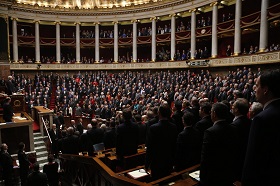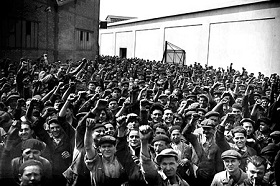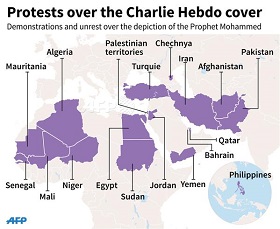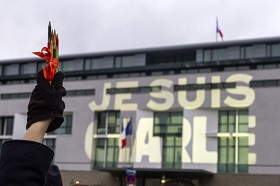Counter-Terrorism Mobilization in France
March in Paris on 11 jan 2015 as protest against
the killing of the Charlie Hesbo cartoonists
In
Login if you are already registered
(no votes) |
(0 votes) |
Doctor of History, Professor at MGIMO-University, RIAC expert
Sunday January 11, 2015 has gone down in the history of France as a day of unprecedented civil mobilization. In Paris alone, one-and-a-half million people – and about four million people throughout the country – marched in defence of republican values, in defence of a society in which the state is committed to respecting civil rights and freedoms. One of the main freedoms is freedom of expression, including the freedom to criticize regardless of authority, be it the authority of power, money or religion.
Sunday January 11, 2015 has gone down in the history of France as a day of unprecedented civil mobilization. In Paris alone, one-and-a-half million people – and about four million people throughout the country – marched in defence of republican values, in defence of a society in which the state is committed to respecting civil rights and freedoms. One of the main freedoms is freedom of expression, including the freedom to criticize regardless of authority, be it the authority of power, money or religion. Looking back at history, there is perhaps only one other example of a mass demonstration that brought together over a million people across France, and was similar in scale and import for the future of the republic. This was the manifestation of February 12, 1934 in defence of the democratic republic under the slogan “They shall not pass” which took place several days after an abortive ultra-right coup (“they” refers to fascists in this case).
For all the differences in the circumstances and the immediate cause that triggered the demonstrations, the message was the same: the French are willing and able to unite at a crunch moment in history to defend the achievements of a modern secular democratic state.
The Goals of the Terrorists Are to Fight Liberal Democracies from Within
The main question is what policy society is prepared to agree with when it comes to the limits of civil freedoms, the content and practice of using counter-terrorist laws.
The appalling murderof members of the Charlie Hebdo satirical magazine staff by the Kouachi brothers, who had just come back from Syria, was the most high-profile of a series of terrorist attacks staged by supporters of the Islamic State (IS), the Islamic radicals who seek to intimidate French society and force the country to abandon its resistance to political Islamization in Africa (Mali) and in the Middle East (in the fight against the IS). As a result, the French people were once again faced with a choice between “order” and democratic values.
Democracy is like a match that can be used to either light a candle or ignite a fuse. In the fight against terrorism, democracy is vulnerable. This is because in a society of freedom and tolerance, radical Islamist sects hostile to democracy meet with fewer physical obstacles. But the strength of democracy lies in maintaining the social contract to follow democratic norms when public rejection of terror bolsters the state’s policy of counteracting extremism. The main question is what policy society is prepared to agree with when it comes to the limits of civil freedoms, the content and practice of using counter-terrorist laws. Today this is the key issue for the future not only of France, but of that part of liberal Europe which is confronted with an unprecedented terrorist onslaught.
First, the IS has reached the borders of NATO (Turkey). There is already a belt of instability, a large zone stretching from Iraq to Syria to Mali, which is under the political and military control of radical Islam bent on building a global Islamic state. Second, thousands of IS supporters, including those who carried out the terrorist attacks in January 2015, are citizens of democratic states against which the IS is waging war. Through them, both the Muslim communities and society as a whole are exposed to traditions and behaviour models that are alien to Europeans. We are talking, above all, about religious intolerance. Fear must become the main censor of the French media, which still follows one of the key recipes of the 18th century French Enlightenment: “Laughter is the main weapon against fear.” This is the kind of censorship that millions of French people have come out against, just like Charlie Hebdo is doing with pencil in hand.
Another target of the terrorists is civil harmony, the social contract that makes all French citizens equal irrespective of racial, ethnic, religious or any other differences. Destroying the public consensus, kindling inter-ethnic and/or religious hatred is a way towards weakening the European democracies. This was the aim of several waves of anti-Semitic actions perpetrated by Islamic radicals that began in 2001 and culminated in the capture of a Jewish supermarket in Paris in January 2015.
The idea of following the American precept and example has both supporters and opponents in France, the latter fearing that it would infringe upon the personal freedoms of citizens.
It is also important to note that such actions, by feeding the people’s sense of insecurity, add to the political capital of the extreme right who advocate decisive action to protect personal safety at the expense of republican freedoms. The public climate created on the eve of the 2002 presidential elections by anti-Semitic members of the Muslim diaspora (although their affiliation was studiously hushed up by the authorities and the media) paved the way to the second round for the leader of the ultra-right National Front Jean-Marie Le Pen. Today his daughter and successor, Marine Le Pen, is posing a serious challenge to the leading political forces in France.
The series of terrorist attacks on January 7, 2015 has shown that the potential terrorist threat in France has turned into a real threat – the main threat to its national security. The unprecedented solidarity displayed by the European and world leaders who came to Paris to take part in the march on January 11 shows an awareness of the universal character of the threat. What matters is how effective and adequate the counter measures will be. The French special services have accumulated experience of controlling the terrorist underground, from the early years of the Fifth Republic (when the special services managed to neutralize the OAS within five years[1]), to the beginning of the 1980s (which saw an upsurge of international terrorist networks), to more recent times.
Prospects and Instruments of the Fight against Terror
The idea of following the American precept and example (in the wake of 9/11, the United States passed the Patriot Act which blurs the distinction between the methods of judicial investigation and secret service spying) has both supporters and opponents in France, the latter fearing that it would infringe upon the personal freedoms of citizens. These fears were further fuelled by the Snowden affair. Even so, on November 13, 2014 France passed a law strengthening counter-terrorist measures, and the task now is to make full and resolute use of the powers granted under law while staying within the legal boundaries. The attack on Charlie Hebdo should promote not only social mobilization, but also the mobilization of the state’s resources.
It has to be noted that French law enforcement agencies are quite good at detecting dangerous radicals early: the Kouachi brothers, Coulibaly and Nemmouche (who carried out a terrorist attack on the Jewish Museum in Brussels) were known to the police, but had not been neutralized. However, the November counter-terrorist law forbids French citizens from going abroad to take part in military or terrorist actions. It has criminalized the spread of precursors of explosive devices, allowed administrative bodies to block access to websites inciting terrorism and facilitating the search for data in the “cloud” and on social networks, and toughened punishment for preparing and carrying out single terrorist acts (in French).
The events of January 2015 may trigger a series of measures that could bring about a quantum increase in all kinds of resources (material, logistic and human) for enforcing the law, because from now on the terrorist threat posed by Islamic radicalism is perceived in society as the most immediate.
The Lessons of the January Events
In Europe France, Germany and other multicultural countries with strong Muslim diasporas (above all the UK, Belgium and the Netherlands) are likely to strengthen the common European policy of fighting illegal immigration and forcibly integrating immigrants into European society.
Internally, democratic mobilization has shown that adherence to republican values is above the political differences between the main rival parties. Socialist President Francois Hollande had the backing of Nicolas Sarkozy, leader of the Union for a Popular Movement (UMP), the main opposition party. At a session of the National Assembly to commemorate the victims of the terrorist attacks (January 13, 2015), the speech by Prime Minister of France Manuel Valls, who proposed “emergency measures” and stressed the secular character of the republic, was given a standing ovation by all the members of parliament, an exceptional case in parliamentary practice.
The members of parliament were applauding not just the head of government, although such an ovation would have been a legitimate repeat of the ovation the citizens of Lyon gave the municipal police during the January 11 march. The National Assembly unanimously approved the content of the speech. Manuel Valls announced several basic ideas that will guide France in order, on the one hand, to effectively fight terrorism, and on the other hand avoid a “clash of civilizations” inside France and around the world (in French). This is the main challenge facing the French state and the European multiculturalism.
These ideas boil down to three succinct statements:
- France is waging war on terrorism, jihadism and radical Islam, but it is not fighting religions: Islam and the Muslims;
- the main stake in this struggle is protecting the secular state (“The only thing that it is important to uphold is secularism, secularism and only secularism because this is the heart of our Republic.”);
- a split on ethnic or religious grounds cannot be tolerated.

French members of Parliament observe
a minute of silence to pay tribute to the
17 victims killed in Islamist attacks
In connection with a series of terrorist attacks targeting Jews, of which the most high-profile attack was the seizure of a Jewish supermarket at Porte de Vincennes in Paris, the Israeli Prime Minister Benjamin Netanyahu suggested that French Jews seek asylum in Israel, an offer that did not go down well with the French authorities. As a result, much of the French Prime Minister’s speech was devoted to anti-Semitism in France. Manuel Valls said: “There is historical anti-Semitism that goes back centuries. But there is also the new anti-Semitism on the internet or in the street born in our neighbourhoods, the result of poverty… He who takes up cudgels against French Jews is taking up cudgels against France.” At the same time, Manuel Valls warned against sweeping attacks on the French Muslims: “One of my best friends (who happens to be a Muslim) told me, ‘I am ashamed to be a Muslim.’ I don’t want the Jews in our Republic to feel fear and Muslims to feel shame.” The Prime Minister in his speech categorically rejected xenophobia, racism and anti-Semitism: “Justice must be relentless in its attitude to these preachers of hatred.”[2] Francois Hollande referred to Muslims as the “first victims of fanaticism and intolerance.” (in French).
In Europe France, Germany and other multicultural countries with strong Muslim diasporas (above all the UK, Belgium and the Netherlands) are likely to strengthen the common European policy of fighting illegal immigration and forcibly integrating immigrants into European society. There will be a leap in the quality of joint activities of law enforcement bodies in preventing terrorist attacks and exposing networks in the framework of the integrated European justice system and through Interpol. One pointer in this direction is the massive police operation to neutralize an underground network of terrorists who had returned from Syria and were preparing a series of terrorist acts. Police are verifying the theory that these terrorist groups have links with Amedy Coulibaly who carried out a terrorist act near Porte de Vincennes in Paris. He is known to have bought the weapons used in the attack in Brussels.
Barring a radical change of course by Russia and the West, the need to cooperate in counteracting Islamic terrorism may help to overcome or mitigate the current crisis in relations between Russia and the Western democracies, which would realize that an excessive weakening of Russia is not in their interests.
At the global level, and with respect to Russia: in the security field, France will concentrate on strengthening the international coalition fighting the IS in the Middle East and Africa. That is why it will set great store by military-political solidarity with the United States and consolidation of NATO. At the same time, some of President Hollande’s recent statements (notably concerning anti-Russian sanctions) suggest that he is among those Western leaders who understand the danger of an aggravation of relations between the West and Russia at a time when the European societies that arose from Christian civilization are facing a global threat.
This arguably means that both relations between Russia and the West and the history of Europe or the Euro-Atlantic space are at a dangerous fork in the road. There was an awareness in Russia that security in the region was indivisible, as it made clear in proposing in 2010 to sign a new European Security Treaty. By contrast, Russia sees the struggle against the IS as more of an “external” problem while it is preoccupied with the events in South-Eastern Ukraine, which are also the cause of the biggest differences between NATO and the European Union. In line with the now common pattern, relations between Russia and the West are lurching “from crisis to crisis”, increasing the chances of the growth of the Islamic threat in the truly indivisible Eurasia. An awareness that radical political Islam poses a real common threat may be an important incentive to try to turn this logic around. Islam’s victories in one area would stimulate its advance in others.
Barring a radical change of course by Russia and the West, the need to cooperate in counteracting Islamic terrorism may help to overcome or mitigate the current crisis in relations between Russia and the Western democracies, which would realize that an excessive weakening of Russia is not in their interests. France may be the proponent of this course, although it may be difficult to implement at the present time, given Paris’s diminished clout within the European Union and the inability of France and Germany to find a common stance with regard to the problem.
At the same time, Russia should not spurn more modest, “routine” cooperation within Interpol and in the bilateral format such as the Franco-Russian Cooperation Council for Security, which has existed since 2002. It may come in handy and make a positive step towards restoring trust between the two countries.
[1] OAS (Organisation de l’armée secrète) was a secret organization of the opponents of Charles de Gaulle’s policy of decolonizing the French Algeria who sought to destabilize the regime and assassinate de Gaulle.
[2] The reference is to popular African French comedian M’bala M’bala Dieudonné (who ran for president in France in 2002). Since the mid-2000s his shows, initially directed against any manifestations of racism and xenophobia were repeatedly banned on account of their anti-Semitic attacks, which sounded particularly insulting on the day Coulibaly’s hostages at a Jewish supermarket in Vincent were released. Anti-Semitism united the comedian’s fans (his clips on social networks are watched by millions), among whom there are many immigrants from Africa and the Arab East and supporters of the National Front. Jean-Marie Le Pen is a close friend of Dieudonne, who made a film that was sponsored by Iran.
(no votes) |
(0 votes) |







